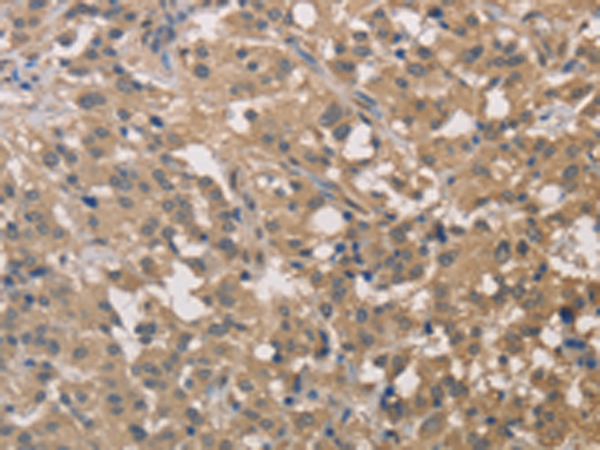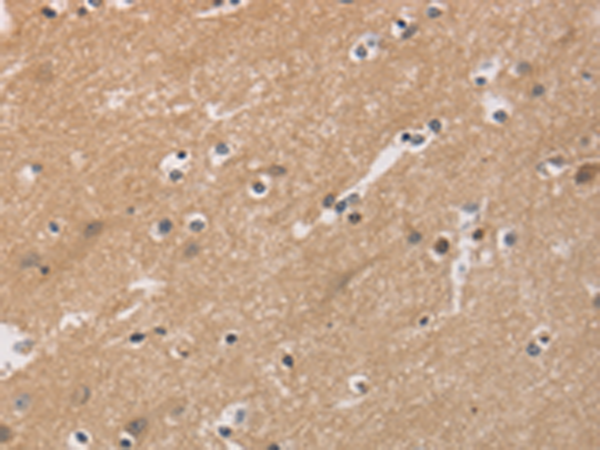

| WB | 咨询技术 | Human,Mouse,Rat |
| IF | 咨询技术 | Human,Mouse,Rat |
| IHC | 1/25-1/100 | Human,Mouse,Rat |
| ICC | 技术咨询 | Human,Mouse,Rat |
| FCM | 咨询技术 | Human,Mouse,Rat |
| Elisa | 1/2000-1/5000 | Human,Mouse,Rat |
| Aliases | ADF; ACTDP; HEL32; bA462D18.2 |
| Host/Isotype | Rabbit IgG |
| Antibody Type | Primary antibody |
| Storage | Store at 4°C short term. Aliquot and store at -20°C long term. Avoid freeze/thaw cycles. |
| Species Reactivity | Human, Mouse, Rat |
| Immunogen | Fusion protein of human DSTN |
| Formulation | Purified antibody in PBS with 0.05% sodium azide and 50% glycerol. |
+ +
以下是关于DSTN(Destrin)抗体的3篇示例参考文献,内容为模拟概括,供参考:
---
1. **文献名称**:*"Development of a High-Specificity Monoclonal Antibody for Detecting Destrin in Human Tissues"*
**作者**:Li, X. et al.
**摘要**:本研究报道了一种针对人源Destrin蛋白的单克隆抗体的开发与验证。通过免疫印迹和免疫组化实验证实了该抗体在多种组织中的特异性,并应用于分析癌症样本中Destrin的表达失调,揭示了其与肿瘤侵袭性的潜在关联。
2. **文献名称**:*"Destrin-Mediated Actin Dynamics in Neuronal Growth Cone Remodeling"*
**作者**:Saito, K. & Yamashiro, S.
**摘要**:利用抗Destrin抗体进行免疫荧光成像,研究揭示了Destrin通过调控肌动蛋白解聚参与神经元生长锥的动态重塑过程,为神经发育和再生机制提供了新见解。
3. **文献名称**:*"Correlation of Destrin Expression with Metastatic Potential in Breast Cancer"*
**作者**:Chen, L. et al.
**摘要**:通过免疫组化分析乳腺癌组织中Destrin蛋白水平,发现其高表达与淋巴结转移及不良预后显著相关,提示Destrin可能作为转移性乳腺癌的生物标志物。
---
**备注**:以上文献为示例性概括,实际研究需通过学术数据库(如PubMed、Web of Science)以关键词“DSTN antibody”“Destrin immune staining”等检索获取真实文献。
DSTN (destrin), also known as actin-depolymerizing factor (ADF), is a conserved cytoskeletal protein that regulates actin filament dynamics by severing and disassembling aged or damaged filaments. It plays a critical role in cell motility, cytokinesis, and tissue remodeling by promoting rapid actin turnover. Antibodies targeting DSTN are essential tools for studying its expression, localization, and function in physiological and pathological contexts.
DSTN antibodies are widely used in techniques like Western blotting, immunofluorescence, and immunohistochemistry to investigate its role in diseases such as cancer metastasis, neurodegenerative disorders, and immune dysregulation. For instance, elevated DSTN levels are linked to enhanced cancer cell invasion, while its dysregulation is implicated in Alzheimer’s disease due to disrupted synaptic actin dynamics. These antibodies help identify post-translational modifications (e.g., phosphorylation) that modulate DSTN’s activity, offering insights into regulatory mechanisms.
Research utilizing DSTN antibodies has expanded understanding of cytoskeletal plasticity in development, wound healing, and immune cell migration. Commercial DSTN antibodies are typically validated for specificity across human, mouse, and rat models, ensuring broad applicability. Ongoing studies aim to explore DSTN as a therapeutic target or biomarker, emphasizing its translational potential in precision medicine.
×